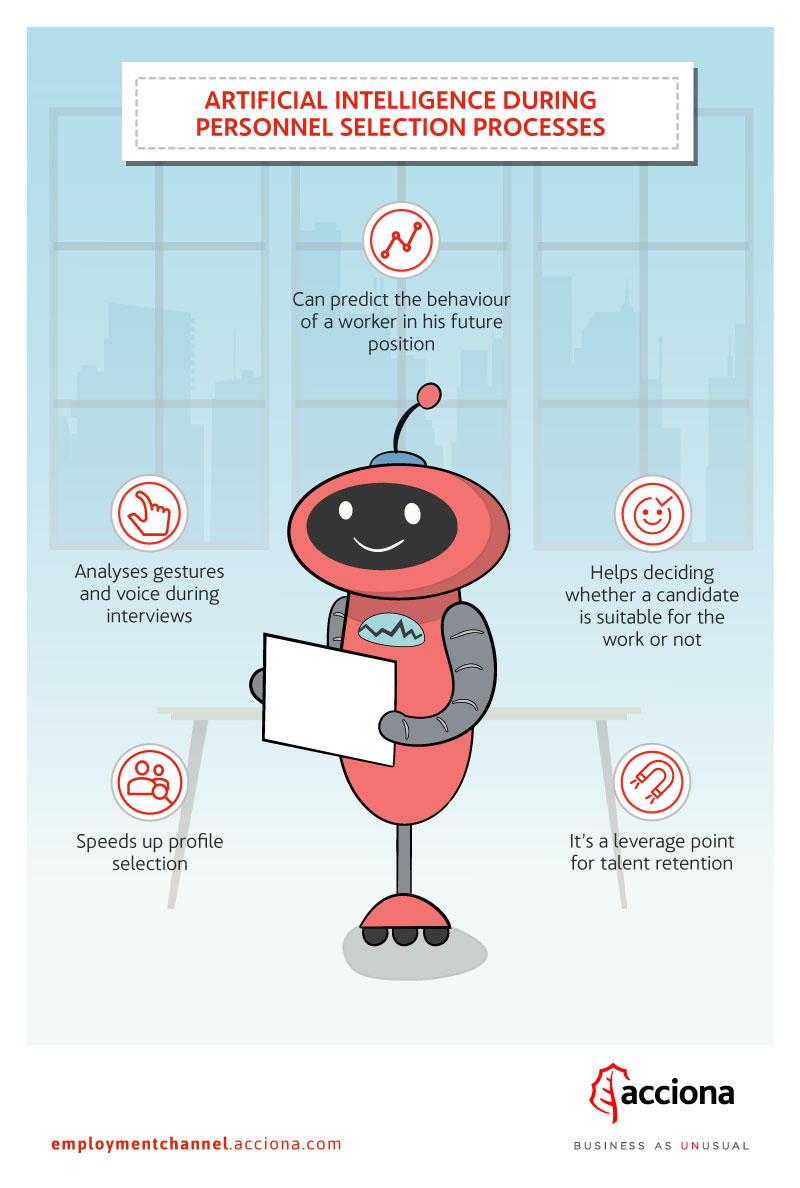One of the main challenges faced by any company’s HR department, regardless their size, is to choose the adequate person for each job position. Traditionally, a staff selection process was based on interviews and a knowledge test of some sort. In recent years, however, some innovations are being introduced in order to fine tune the process even more and save up the company´s time and money.
Will a robot be your next interviewer?
Artificial Intelligence has been utilized on several occasions during the first stages of some staff selection processes with the purpose of comparing resume data and sifting candidates. Nevertheless, in recent years a further step has been taken and it´s also been included during the interview stages. In the UK the number of companies sitting candidates before a camera capable of capturing and analysing their gestures and voice while they answer standard-type questions is increasing. By doing so, they seek to know the true personality of the interviewee and predict how they will behave in their job.
Besides, Hanson Robotics has unveiled Sophia, a humanoid robot introduced last October during the Human Resources Conference held in Barcelona, Spain. In said venue, Sophia showcased its recruiting abilities during a job interview. Its developers claim that with these kind of robotic entities prejudices are gone and the hiring choice is based exclusively on the candidate´s accomplishments.

Staff selection through auditions
Another innovative way to hire people that leaves the interviewing process out, is auditioning. In particular, the method mimics the idea of the try-outs musicians or actors must go through so as to get a job. As an example of this, we could mention the American company Menlo Innovations. One of their staff selection processes is comprised of diverse stages, allowing recruiters to find the ideal profile for a certain vacancy. In an initial phase, the company gathers 50 candidates in groups of two so that they work together for 20 minutes. This way, they can see how they perform when working hand in hand with a colleague. During that process, and while HR department pays close attention to their interactions, they change partners up to three times. For a candidate to go through the next stage, however, all recruiters must give their approval. The second stage of the selection process entails working a whole paid day on actual projects along with two other candidates. Finally, the best one among them goes through a final, three-week, paid stage that will allow HR department to know for certain if the candidate is the ideal person for the job.
Apart from that, studies conducted by Ron Friedmann, an award-winning social psychologist, argue that auditions create a better approach regarding staff selection and a better working environment, since the most adequate individual in terms of both job and corporate culture is the one selected eventually. Auditions are also expected to get rid of prejudices that, subconsciously, lie in the mind of the person conducting the interview. Friedmann claims that, for instance, good-looking people are perceived as more capable and tall people as better leaders.
“Blind” job interviews
Another innovation to avoid prejudice during staff selection processes are “blind Interviews”. The CEO of Automattic, the company behind WordPress, shared with Harvard Business Review the way he selected candidates: “I conduct interviews through Skype chat or instant messaging. I never know anything about the gender or ethnic group of the candidates”.
One of the most crucial parts during a selection process is to know how to find out if the candidate is lying, something that, according to Friedmann, 81% of them does. He argues that the explanation to this kind of behaviour lies in an atmosphere which leads them to think that the only way to get the job is by being dishonest. In order to avoid that pressure, there are some companies that opt for a more casual scenario in which the candidates can relax and show their true colours or even reveal other details that they would not give away otherwise. Explaining how the interview is going to develop, with the purpose of making candidates feel they’re active participants, is of great help.
Mark Murphy, expert in leadership and founder of Leadership EQ, suggests to compose a script similar to the following: “I read your resume and I’m very excited to know more about you. I’d like to dedicate the next 40 minutes to learn everything about you, your story, the things you have done and the experiences you had. After that, what I would like to do is to leave the last ten minutes so that you can ask me any question you may have. Is that okay?”.
In conclusion, these innovations have allowed staff selection processes to increase their efficiency level, both for recruiters and candidates. As a consequence, both sides obtain a deeper knowledge from each other, which entails many advantages for every party involved, such as quick and practical decision taking and, in some instances, a considerable reduction of time and management procedures.
Sources: Inc, Forbes, The Guardian, Reuters, Leadershio IQ and Harvard Business Review
At ACCIONA our aim is for our workforce to be made up of the best professionals around. We want people who wish to contribute in designing a better planet. Discover our job-offers available worldwide.